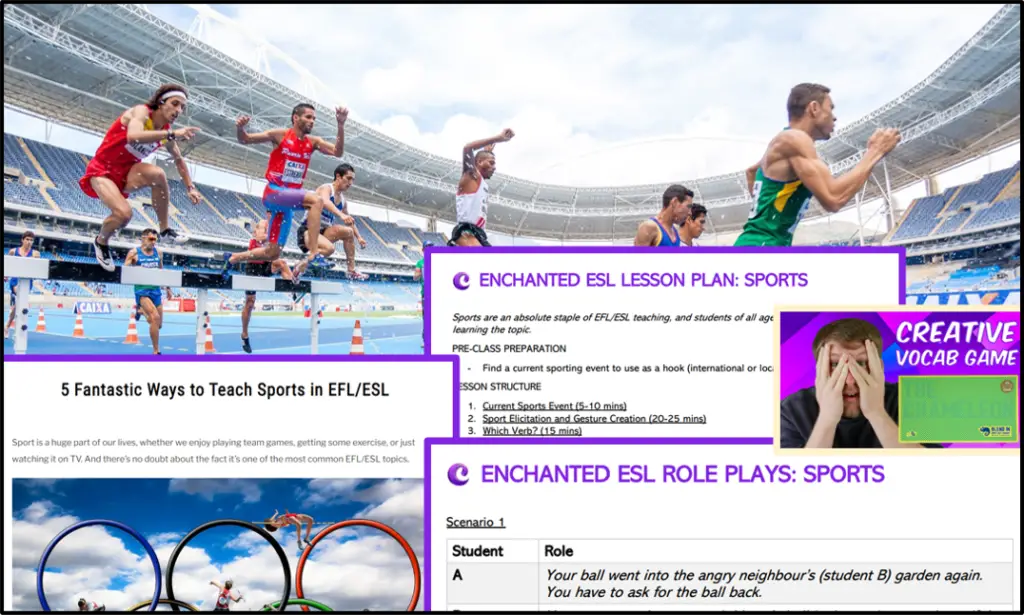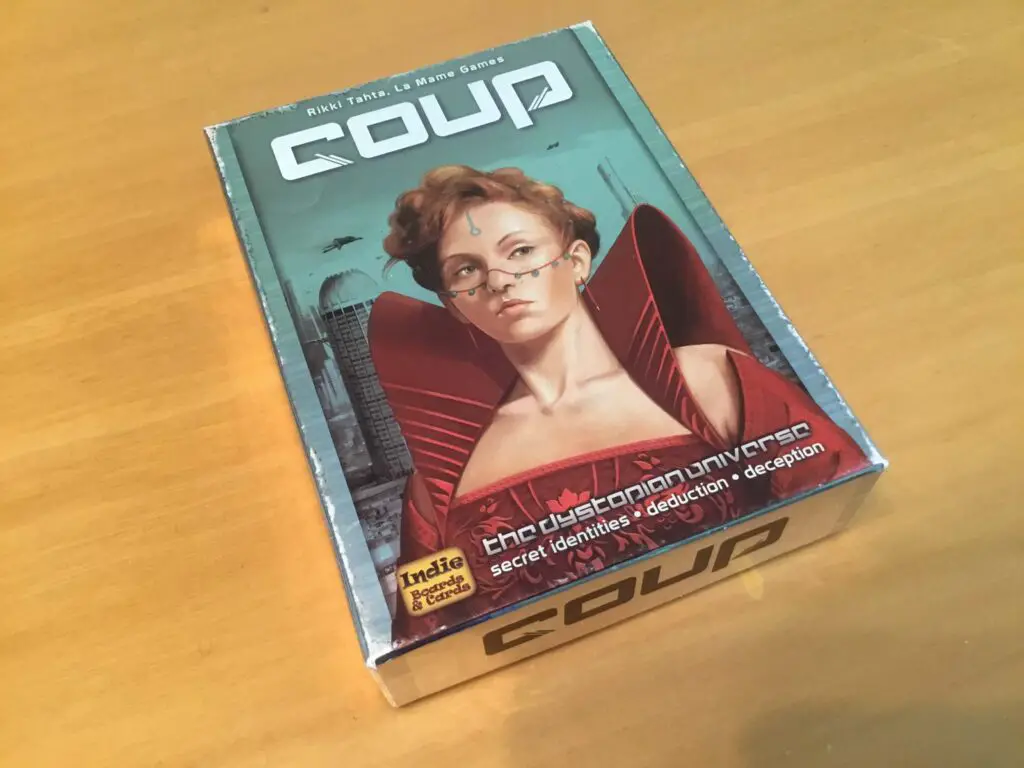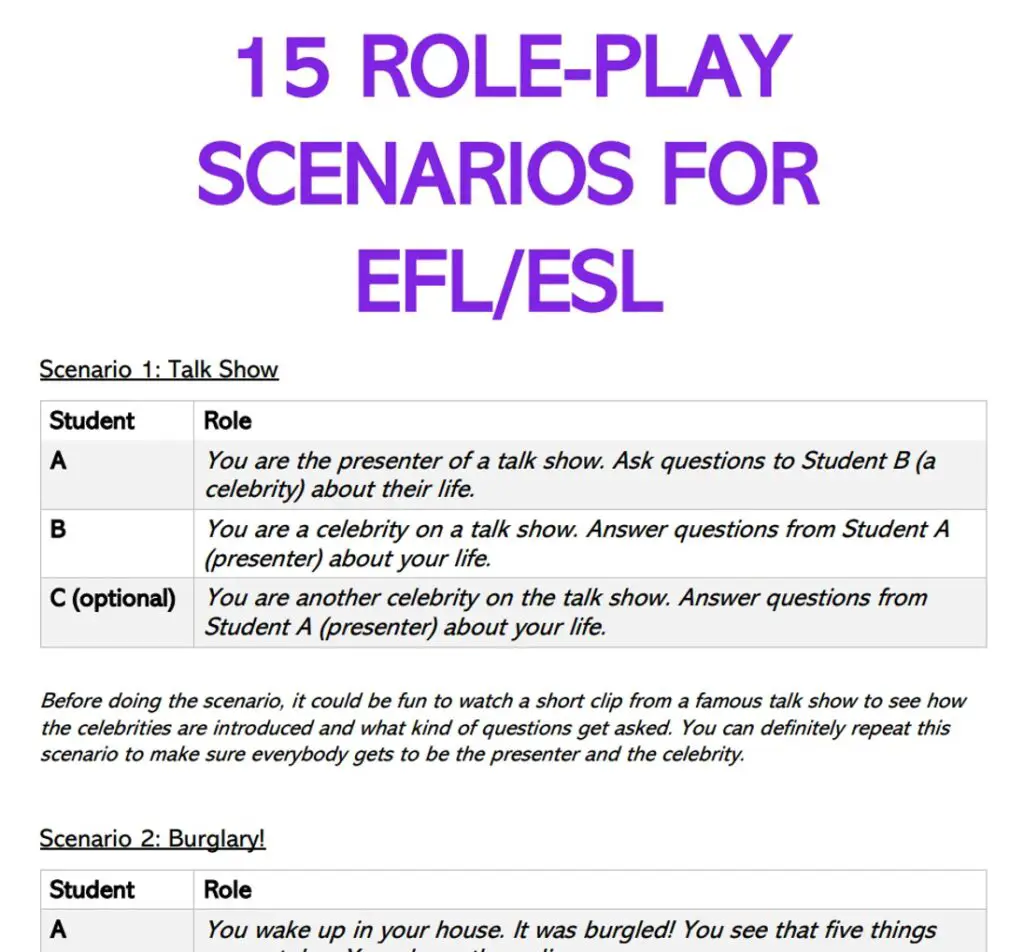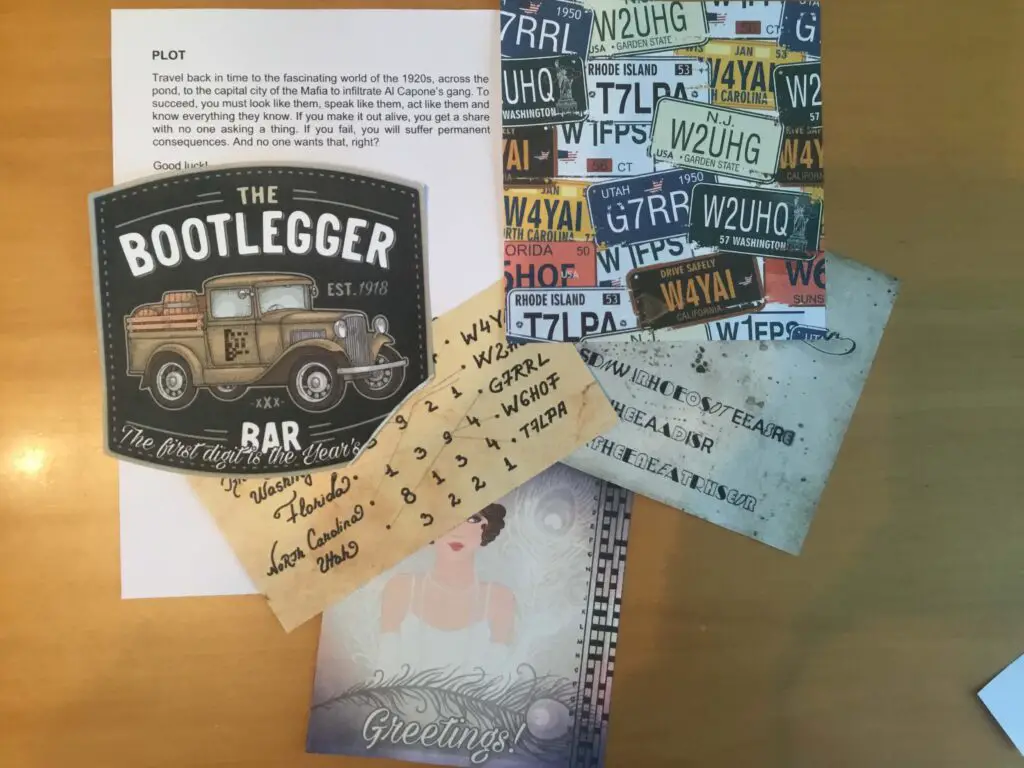When English learners reach an advanced level, it’s tempting to think they’re beyond the type of games and fun activities we use with lower-level students. I think that’s in part because advanced learners tend to be older, so classes should feel more serious.
I disagree with this notion. It suggests games aren’t as effective as bookwork and deliberate study. Sure, I wouldn’t make a group of adult learners run around the classroom with a game such as Board Race… at least most of the time.
But it’s important to have variation. Serious study is valuable, but don’t discount the transformative effect an injection of fun can have on a classroom of adults.

With that in mind, here are 9 games and activities picked out from my own experience that are challenging enough for advanced learners.
- Just a Minute
- Social Deduction Games (e.g. Spyfall, Coup, Detective Club)
- Alibi
- Role Plays
- Say Anything
- Countdown
- Escape Rooms
- Call My Bluff
- Narrative Telephone
Sometimes you need specific games for advanced learners, and other times you can adapt games aimed at lower ability students. Either way, my free ebook of 20 EFL/ESL games is for you. The games inside it can be modified for a greater challenge, and I give detailed instructions and guidance for doing just that.
You can get the free ebook by signing up to the Enchanted ESL Newsletter. Subscribers also get access to a whole load of other exclusive resources and receive monthly emails with role-play scenarios, lesson plans and even more brilliant games. All for free!

Enchanted ESL Resource Trove
- Lesson plans
- Role-play scenarios
- Printable game materials
- 20 ESL Games eBook
- Monthly newsletters with more free stuff!
1. Just a Minute
Just a Minute is a game featured on Radio 4 in the UK for over 50 years. It’s simple, demanding, and flexible.
Estimated time: 5 minutes per round
Energy level: 3/5
Materials: Timer
How to play
One person starts as the speaker. Assign them a topic, for example, “American Sports”. They have to talk about the topic for 60 seconds (set a timer). They must not repeat any significant word during the 60 seconds, except for the words in the topic phrase, so in our example, they can repeat “American” and “Sport”.
At any time, other students can raise their hand and say “challenge”. Stop the timer. The challenger then identifies which of three things the speaker has done:
– Hesitation: Err, umm, long pauses, tripping over words.
– Repetition: Repeating a significant word not in the topic phrase.
– Deviation: Changing the topic (e.g. talking about American food).Decide if the challenge is valid or not. If it is, the challenger gets 1 point, and takes over the role of speaker. They may repeat any words the previous speaker(s) said.
If it’s not a valid challenge, the current speaker gets 1 point and continues from where they left off.
Whoever is speaking when the 60 seconds runs out earns 3 points.
It can take a few rounds for students to get the hang of the game. The decision whether a challenge is valid or not is up to the teacher, which can be a little stressful if you don’t stick to consistent rules. Here are some tips.
TIPS:
- With hesitation, allow a short pause (1 second) between words and sentences.
- Repetition of words like: a, is, on, of, the, etc. should be allowed. I don’t consider them significant words like nouns, verbs and adjectives, etc.
- If students are reluctant to challenge, let them know which ones they could have made, so they have a better idea next time.
- Speaking in an unnatural, robotic manner is allowed.
- Challenging at the last second is allowed.
- This game can be too stressful for some. On the other hand, it’s great practice for situations like job interviews and presentations.
2. Social Deduction Games (e.g. Spyfall, Coup, Detective Club)
Board games have come on leaps and bounds in the last decade or so. While I wouldn’t normally recommend games like Monopoly or Settlers of Catan for EFL/ESL classes, since they require little English, social deduction games are a different matter.
Estimated time: 5-20 minutes (depending on the game you choose)
Energy level: 3/5
Materials: Purchased board game
Each of these games has different rules, but they all boil down to the same principle:
A minority (one player or a small group) are evil/bad/spies, while the majority (everyone else) is good. Through playing the game, the good players have to identify the baddies, and the baddies have to kill/sabotage/escape from the goodies.
They’re best with groups of 5-8, although some can cater to different sized groups.
Watch as your students interrogate, blame, lie and betray their way to victory – all skills which develop the kind of confidence and fluency you’ll never get from textbooks.
As with Just a Minute, these games can get a little… tense. Or, in some cases, students are too shy to go after one of their classmates. You have to read the room.
- For a more chilled, logical experience, go for Spyfall or Detective Club.
- If you want edge and excitement, One Night Ultimate Werewolf is a fantastic option, as is Coup. I’ve had particular success with Coup, although after half a dozen sessions, they stop learning much new English.

Of course, you’ll have to buy the game. They aren’t cheap ($10-30), but they have excellent re-playability, and nobody’s stopping you from playing them at home with your friends!
Learn how to play Spyfall and get the best out of it in your classes in this video I made!
And if you found that video helpful, make sure to subscribe to the Enchanted ESL YouTube channel where I share loads of other games!
3. Alibi
No surprise this one’s on the list. Really, you can play this game with intermediate students, but it scales up to advanced classes and may even be better. You’ll need at least 4 players, but it’s best with 6-10.
Estimated time: 30-40 minutes
Energy level: 2/5
Materials: Paper and pen
It helps to have two separate rooms, but it’s not compulsory. As long as the room is big enough for two conversations to take place without the others being able to hear easily, you can manage.
How to play
Part 1
Choose two players as criminals. They are to be questioned for committing a crime (you invent the crime – a murder in Paris, arson in Beijing… whatever you want).
The criminals go out of the room. They have 10 minutes to come up with a false alibi for the day of the crime, which will be put under scrutiny. They must include 3 places they went to, and they must have spent the whole time together.
They have to be clear on the details of their story else they’ll get found out.
Back in the classroom, divide the other students into two teams of police detectives. They have to come up with useful questions they’re going to ask the criminals. They know the criminals went to 3 places and spent the duration together.
Part 2
The criminals get questioned by the police teams one at a time. This is where having two rooms helps, as you can have one police team with one criminal in each room so the criminals can’t communicate.
The detectives ask the suspect the questions they’ve prepared (and any others they think of) over the course of 5 minutes. They will have to take notes.
Important: The suspect may not answer “I don’t know” or anything similar. They must give tangible information in their answer and respond promptly to questions.
Once the time is up, criminals change places and are interrogated by the other police team. The detectives have to find inconsistencies between what the two suspects say.
Resolution
The police teams assess their information. If they can find 3 differences between the suspects’ stories, that’s enough evidence to put them in prison (police win!). If they can’t find 3 differences, they don’t have enough proof – the criminals win!
While it takes the best part of a lesson, this game works wonders with advanced students. They love coming up with alibis and especially enjoy catching their classmates out.
TIPS:
- You can vary the number of inconsistencies required to adjust the difficulty for the criminals. Up the requirement to 5 if the criminals never get away with it, or reduce it to 2 to help the detectives.
- Be strict on timings. The criminals will beg you for more time to prepare their alibi – don’t give it to them.
- Encourage detectives to think outside the box for questions. “What were you both wearing?” might be something the suspects haven’t thought of.
- Make sure the suspects have no way of communicating during or between questioning sessions. This is especially important if you’re playing the game in one room.
4. Role Plays
If you’ve read many other articles on this site, you’ll know I’m a huge proponent of role plays. While you can use them with intermediate students, they come alive with advanced learners who have the fluency and confidence to embrace their roles.
To find out why I love role plays so much, check out my article: Why All EFL/ESL Teachers Should Use Role Play Activities
Give your students a chance to show off. Put them in an imaginary scenario where they have to act, interact and react with their classmates to find a solution.
Classic role play scenarios include:
– ordering food at a restaurant
– asking for directions
– job interview questions
But why not take things up a level? Have them negotiate business deals from start to finish, organise a political debate where they each take on the role of politicians of dubious integrity, or how about you stick them on a desert island where they have to work together to survive?
Add some dice rolls to create the potential for their actions not working out and… hey, you’ve got a tabletop role-playing game!
These role-playing games are my favourite activities of all. They’re beyond anything else I’ve ever used in my classes, and they bring up so many opportunities for learning English in a practical, enjoyable manner.
If you’re after role-play scenarios to use straight away, you can get your hands on loads as a Newsletter subscriber. If you sign up I’ll send you 15 and then every month you get more, plus access to all of them from previous months. That’s over 50 scenarios all for free!
Enchanted ESL Role-Play Scenarios
- 15 unique scenarios
- 3 themed scenarios every month
- Access to all scenarios from previous months
- Guidance on how to use role play

5. Say Anything
Many games on this list are popular with native English speakers, and Say Anything is no exception. It’s a simple, but effective party game with plenty of discussion.
You can buy the board game (which I recommend), or devise your own version using paper, pens and a bit of imagination.
Estimated time: 10-20 minutes
Energy level: 2/5
Materials: Board Game contents (or paper & pen/A4 dry erase pockets)
How to play
One person asks a question (either written on a prompt card or something they come up with) e.g. What’s the worst place to spend the night?
As soon as they’ve said the question, the other players write an answer on a piece of paper (or A4 dry erase pocket). They should aim for an answer which the person who asked the question will like the best. For example, Player A writes: “Under a bench”, Player B writes: “In a freezer” and Player C writes “At the bottom of the sea”.
When they’ve written their answers, they put them in the centre of the table. They can’t repeat what someone else has written (first to put their answer on the table gets priority).
The questioner then secretly makes a note of which answer they think is best. They cannot change this decision.
Now, the players discuss the answers and each predict which they think the questioner has picked (the questioner doesn’t take part in this conversation). The players place a token (or write their name) on the answer they predict. For example, in the discussion, all the players might think the questioner will choose “At the bottom of the sea”.
Then the questioner reveals the correct answer. Award a point for every correct prediction, and one point for the person who wrote the answer chosen by the questioner.
With creative students, this game produces hilarious answers. What’s more, if you come up with your own questions, you can adjust them to apply to the topic you’re studying.
TIPS:
- Be the questioner the first couple of times, so everyone gets used to the rules.
- Encourage answers using unique and creative English.
- Unless your class is very informal, avoid edgier questions (you may have to screen the cards supplied with the bought game).
6. Countdown
Another classic. Anyone from the UK will know exactly how this game works, but for those who don’t, it’s all about making words from randomly given letters.
Estimated time: 3 minutes per round
Energy level: 1/5
Materials: Paper & Pen, this website: https://incoherency.co.uk/countdown/practice/
You can play the Countdown game on your phone, tablet or computer without needing to download anything by going to this website.
The written instructions are below, but here’s a video I made explaining it in detail:
How to play
The aim is to make the longest word you can using the letters provided in just 30 seconds.
First, let one of your students pick either “consonant” or “vowel” for each of the nine letters (4-5 of each usually works best). Everyone should write down the nine letters.
Start the timer, and while the music is playing, all the students should try to make the longest words possible. They can only use each letter once.
At the end of the 30 seconds, each player says how many letters they got, and then reveals their answer (shortest word first). The person with the longest word wins as many points as letters in their word. If they get a nine-letter word (very rare), they get double – so 18 points!
TIPS:
- If your students struggle, give them 60 seconds instead of 30. This is an option on the website linked above.
- Take part yourself. If anyone can beat the number of letters you get, give them extra points!
- Click the “Show Answers” button at the end to reveal the best possible words.
- Bonus: Click on the “Conundrum” button to get an instant 9-letter anagram and see who (if anyone) can get the word first.
7. Escape Rooms
Estimated time: 45-60 minutes or more
Energy level: 2/5
Materials: Print-and-play escape room. Go to Mystery Locks to see their range.
Over the last few years, escape rooms have exploded in popularity. They often involve going to a wonderfully designed location with a group of friends or family and solving various puzzles, cracking codes and escaping the room.
But did you know you can bring these to your classroom?
I discovered print-and-play escape rooms which are perfect for advanced learners and don’t cost much at all. The reasons I like them are:
- They come with clues and instructions in English for students to test their understanding.
- Teamwork is vital. Students have to communicate effectively to solve the problems.
- Some puzzles challenge pattern recognition of English letters and spellings.
- Preparation is easy for the teacher.
It takes a little while to print the materials and cut them out, but plenty of it is reusable, and you don’t have to invent with your own complicated puzzles.
I bought The Roaring ’20s Escape Room from Mystery Locks and my students had a great time playing. The puzzles are hard, but advanced EFL/ESL students can handle them. And if the 1920s aren’t your jam, there are plenty of other themes available. For the record, I’m not affiliated nor receive money from Mystery Locks. I just think they’re great!

If you like devising your own mysteries and secret codes, why not make a custom escape room? It might be a lot of effort, but imagine the learning possibilities of tailoring each puzzle to their needs!
8. Call My Bluff
British panel shows are a treasure trove. This is probably the best-known game on this list, and for good reason. Not only does it boost vocabulary, but players really have to think about how to present words in the most natural way possible.
Estimated time: 5 minutes per round
Energy level: 2/5
Materials: Paper and pen
The UK TV series ended in 2004 and used a variety of obscure words. In the EFL/ESL version, choose words which are appropriate for your students – hard enough for them not to know the meaning, but common enough for them to be useful.
Below are the written rules, but I recommend you watch this video I made first:
How to play
Divide the class into 2 teams. If you have a large class (10+) divide them into 4 or 6 teams and have multiple games going on at the same time.
Give both teams a piece of paper with a word they won’t know and its definition without showing the other team. For example, “to chortle” with the definition “to laugh in a noisy, happy way”.
Each team has 3 minutes to come up with two more definitions for their word, which they use as bluffs. For “to chortle” they might think of “to eat so fast you get sick” and “to walk with confidence”.
They then read their 3 definitions to the other team, who have to identify the correct definition. If they choose correctly, they get a point. If they don’t, the bluffing team gets a point.
The teams need to make their bluffs seem plausible. This means thinking carefully about the structure of the sentence and avoiding any mistakes that’ll give away the bluff.
TIPS
- Use words which are just outside your students’ reach so they gain new vocabulary.
- Make sure the words aren’t similar in their native language, especially if they speak Germanic or Latin based languages.
- Short words are as useful as long words: pike, jab and gnat are some great examples.
I made a big list of words and definitions you can use in Call My Bluff. And it’s free! All you need to do is sign up to the Enchanted ESL Monthly Newsletter and you’ll get to my free resources for subscribers (it’s packed full of other fantastic games and activities, too!)
9. Narrative Telephone
Estimated time: 30 minutes
Energy level: 1/5
Materials: A short story (2-3 minutes to read)
This one requires a bit of logistical creativity, but it’s worth the effort. You can use it in class, online, or as part of an ongoing homework activity.
Everyone knows the telephone game. You start with a message and as it gets passed down the line, it gets twisted and transformed, coming out the other side completely different. It’s a great game for beginners and intermediates.
Narrative Telephone steps it up a level. Instead of passing along a short message, players tell a story.
How to play
One person starts as the storyteller. This should probably be you, the teacher, to begin with. The storyteller comes up with a short story (about 2 minutes to read out loud).
They tell the story to one student in the class without the others hearing. If this is in a physical class, go out of the room to a quiet place. Online, you could go into a private chat. Between classes, it works really well to record a video/audio and send it to the student.
That student can only listen to the story ONCE. And no questions. As soon as they have listened to it, they retell it to another student, trying to remember the details as best they can.
Again, the next student can only listen once before passing it on, and this continues until the last student has heard the story.
The last student tells the story as best they can and you all work out what has changed or stayed the same.
The amazing people at Critical Role came up with the game during the lockdown of 2020. Here’s a video so you can watch the masters in action.
TIPS
- Use the starting story to introduce or reinforce content you’ve been studying.
- If you don’t feel you can come up with a story of your own, the internet is full of short stories to use.
- When you’ve done it a few times, let one of the students be the storyteller.
- Tell your students it doesn’t matter if they don’t get the story right when they pass it on – it’s all for fun. If you’re doing it outside of class with recorded video/audio, there’s a chance students will cheat and listen to the story multiple times, so make sure they all understand there’s no pressure to remember all the details perfectly.
- Encourage students to be creative with their retellings.
- If you’re doing the activity in a physical or online class, plan something for the other students to do while they’re not involved.
- Keep any videos/audios as people love to listen back.
PRO TIP: If your students are shy, or you want to practice writing, you can play a written version of this game. It works exactly the same, but instead of telling the story out loud, students write it on paper and pass it to the next in line.
Modify and Adjust
The joy of teaching English at an advanced level is the challenge of adapting to each individual student. They have different backgrounds, strengths, and interests.
Finding games and activities to suit them can be tough. And you’ll need to be flexible. Take these 9 ideas and use them as you see fit – be creative and change them to suit what your class needs.
In my free ebook of 20 EFL/ESL games, I give a lot of tips on how to adapt the games for different ages, abilities, online and offline, with groups and individuals. Get the ebook now by signing up to the Enchanted ESL Newsletter, and also get monthly emails with advanced role-play scenarios, lesson plans and more games!

Enchanted ESL Resource Trove
- Lesson plans
- Role-play scenarios
- Printable game materials
- 20 ESL Games eBook
- Monthly newsletters with more free stuff!
If you’re looking for more games and activities, check out my other lists:
9 EFL/ESL Speaking Games & Activities Perfect for Beginners
9 EFL/ESL Games & Activities for Intermediate Learners
9 EFL/ESL Games and Activities for Advanced Learners
9 High Energy EFL/ESL Games for Boosting Vocabulary
9 Engaging Homework Ideas for EFL/ESL: No worksheets!
9 Exciting EFL/ESL Activities for Writing & Spelling
9 Fun EFL/ESL Games & Ideas With Standard Playing Cards
9 EFL/ESL Games With No Materials or Preparation Needed
9 EFL/ESL 5 Minute Games Every Teacher Needs to Know
9 Superb EFL/ESL Games & Activities Using Just Pen & Paper
9 Classy EFL/ESL Games & Activities for Adults (+ tips)
9 Confidence-Boosting EFL/ESL Speaking Games for All Levels
9 Exciting Flashcard Games for EFL/ESL Classes









